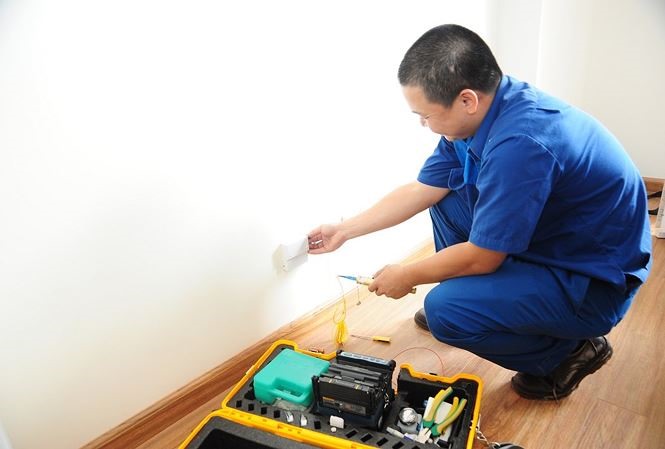 Society
Society

Watching cable television and accessing the internet are now basic needs for the majority of households in Việt Nam, but in many apartment buildings in big cities like Hà Nội and HCM City, residents are unable to freely choose their telecom and internet service provider.
 |
| Tenants of many apartment buildings in Hà Nội could only use one telecom service provider selected by the building management board for internet or cable television. — Photo tienphong.vn |
HÀ NỘI — Watching cable television and accessing the internet are now basic needs for the majority of households in Việt Nam, but in many apartment buildings in big cities like Hà Nội and HCM City, residents are unable to freely choose their telecom and internet service provider.
The reason for this is that building developers are partnering with one cable TV and internet provider. This prevents apartment residents from choosing providers other than those selected by building owners, Tuổi Trẻ (Youth) newspaper reported.
Wishing to remain anonymous, T.A, who lives in Đồng Mô Đại Kim Social Housing in Hà Nội’s Hoàng Mai District, said despite the crowded buildings, the Viet Nam Post and Telecommunication Group (VNPT) was the only telecom service provider in the area.
“As there is no competition, not much attention has been paid to improving the quality of services,” she told the newspaper, adding that the internet speed was not as fast as in other areas.
Trần Quốc Huy, head of the Management Board of Đồng Mô Đại Kim Social Housing, acknowledged that there was only one internet service provider since the building was put into operation in December last year. Local residents have repeatedly complained about the service quality and customer care policy of the provider, he said.
Huy said the management board would soon invite other telecom companies to jointly supply the service.
Nguyễn Hương Giang who lives in Yên Hòa urban area in Cầu Giấy District told Việt Nam News that the internet connection at her apartment had been disrupted a number of times over the past six months, affecting her business. She has complained to the service provider and technicians were sent to her house, but the problem persists.
In the meantime, she is unable to cancel the contract as there are no alternatives.
“Why do we have to use one service provider forever when we want to access a better one?” Giang said.
Concern over the monopoly of telecom services at apartment buildings was also reported in HCM City.
Trương Hoàng Khanh, who resides in Melosa Garden Khang Điền residential area in HCM city’s District 9, said a lot of apartment owners had to abandon old telecom contracts and sign new ones when they moved to new houses even though they were valid for a year. It was a waste of money, he said.
Other people said that despite having more than one supplier available, tenants at many apartment buildings still found it hard to change from one service to another.
“We can choose to have internet service from VNPT or a package of cable television and internet service from SCTV at my apartment building. However, we can only have a copper cable instead of fiber optic due to a lack of infrastructure,” said Nguyễn Ngọc Duy, a resident from Bàu Cát 2 Apartment Building in Tân Bình District.
So what is the solution?
According to Nguyễn Xuân Quang, deputy director of Hà Nội’s Department of Information and Telecommunications, despite the city’s efforts to stop telecom companies from dominating apartment blocks and create a fairer environment for telecom services, monopolies still exist at some apartment buildings in Hà Nội where tenants could only use one provider selected by the building management board for internet or cable television.
To solve the issue, the department would conduct inspections and strictly deal with violators, he said.
Earlier in 2016, Hà Nội authorities issued a decision banning monopolistic television and internet services at high-rise buildings in the city. Developers were required to use at least two telecom firms or a backup one in each block.
The same regulation on the operation of telecom services at apartment buildings was also issued by HCM City authorities in March last year. Accordingly, owners of inner-city apartment buildings have to develop infrastructure that offers tenants a wide range of choices for television and internet subscriptions.
Lawyer Vũ Quang Đức from HCM City Bar Association suggested that the Government’s Decree 25/2011 which guided the implementation of the Law on Telecommunications should include the requirement of two telecom service providers in the design of apartment buildings.
This idea was also shared by Hoàng Trung Kiên, deputy general director of FPT Telecom.
“It was necessary to have close coordination between the Ministry of Information and Communications and Ministry of Construction in introducing regulations on the design and investment for telecom infrastructure in a bid to rein in monopolies in telecom services,” he said.
Like the one on electricity, water supply and fire safety, the regulations should be set up in the early stages of the projects and inspections should be conducted regularly, Kien said.
“Only by doing so, could telecom service providers enjoy a fairer playing field and consumers have the best choice,” he said. — VNS




